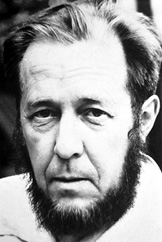Source: Acton Power Blog
By John Couretas
 “During all the years until 1961, not only was I convinced that I should never see a single line of mine in print in my lifetime, but, also, I scarcely dared allow any of my close acquaintances to read anything I had written because I feared that this would become known. Finally, at the age of 42, this secret authorship began to wear me down. The most difficult thing of all to bear was that I could not get my works judged by people with literary training. In 1961, after the 22nd Congress of the U.S.S.R. Communist Party and Tvardovsky’s speech at this, I decided to emerge and to offer One Day in the Life of Ivan Denisovich.”
“During all the years until 1961, not only was I convinced that I should never see a single line of mine in print in my lifetime, but, also, I scarcely dared allow any of my close acquaintances to read anything I had written because I feared that this would become known. Finally, at the age of 42, this secret authorship began to wear me down. The most difficult thing of all to bear was that I could not get my works judged by people with literary training. In 1961, after the 22nd Congress of the U.S.S.R. Communist Party and Tvardovsky’s speech at this, I decided to emerge and to offer One Day in the Life of Ivan Denisovich.”
Alexander Solzhenitsyn’s momentous decision to publish his slim volume on Gulag life (he feared not only the destruction of his manuscript but “my own life”) ended his period of “secret authorship” and put him on the path of a literary career that earned him the Nobel Prize for Literature in 1970. But his work meant so much more than that. Solzhenitsyn, who died yesterday in Moscow at the age of 89, did more than any other single figure to expose the horrors of Soviet communism and lay bare the lies that propped it up. His life was dedicated to chronicling and explaining the Bolshevik Revolution and the tragic effects it wrought for Russia during the 20th Century. His was a first-person account.
In “Solzhenitsyn & the Modern World,” an essay on Solzhenitsyn published by the Acton Institute in 1994, Edward E. Ericson Jr. predicted that Solzhenitsyn’s influence would continue to expand. With his passing, there is good reason to hope, with Ericson, that Solzhenitsyn’s “world-historical importance” will be appreciated on a deeper level. “His most direct contribution lies in his delegitimizing of Communist power, and especially in the eyes of his surreptitious Soviet readers,” Ericson wrote.
At the publication of the Gulag Archipelago, Leonid Brezhnev complained: “By law, we have every basis for putting him in jail. He has tried to undermine all we hold sacred: Lenin, the Soviet system, Soviet power – everything dear to us. … This hooligan Solzhenitsyn is out of control.” A week later, the newspaper Pravda called him a “traitor.” On Feb. 12, 1974, he was arrested and charged with treason. The next day, he was stripped of his citizenship and put on a plane to West Germany. He would spend the next 20 years in exile.
When summoned for deportation in 1974, he made a damning written statement to the authorities: “Given the widespread and unrestrained lawlessness that has reigned in our country for many years, and an eight-year campaign of slander and persecution against me, I refuse to recognize the legality of your summons.
“Before asking that citizens obey the law, learn how to observe it yourselves,” Solzhenitsyn wrote. “Free the innocent, and punish those guilty of mass murder.”
The Gulag Archipelago was described by George F. Kennan, a former ambassador to the Soviet Union and the chief architect of postwar U.S. foreign policy, as “the greatest and most powerful single indictment of a political regime ever to be leveled in modern times.”
In my review of the “Solzhenitsyn Reader,” edited by Ericson and Daniel J. Mahoney, in the Spring 2007 issue of Religion & Liberty, I wrote that the Solzhenitsyn “could only understand what happened to Russia in terms of good and evil. Those who engineered and imposed the Bolshevik and Soviet nightmare were not merely ideologues, they were evildoers.” A former communist, the writer returned to his Russian Orthodox Christian roots after his experience of the Soviet prison camps. In the review, I said:
Ericson and Mahoney state simply that, “Solzhenitsyn was the most eloquent scourge of ideology in the twentieth century.” The editors are right to remind us of that. And any news account, biography or political history of the twentieth Century that talks about who “won” the Cold War—a complicated historical reality for sure—and does not include Solzhenitsyn with Reagan, Thatcher, and Pope John Paul II is not only incomplete but wrong. Solzhenitsyn was the inside man.
In an editorial published today, the editors of National Review Online said this of Solzhenitsyn: “There was no greater or more effective foe of Communism, or of totalitarianism in general.”
French President Nicolas Sarkozy called Solzhenitsyn “one of the greatest consciences of 20th century Russia” and an heir to Dostoevsky. Mr Sarkozy added: “He belongs to the pantheon of world history.”
Russian Prime Minister Vladimir Putin wrote in a telegram to Solzhenitsyn’s family that the Soviet-era dissident, whose books exposed the horrors of the Communist Gulag, had been “a strong, courageous person with enormous dignity.”
“We are proud that Alexandr Solzhenitsyn was our compatriot and contemporary,” said Putin, who served in the same KGB that persecuted the author for “anti-Soviet” activities.
Mikhail Gorbachev told Interfax: “Until the end of his days he fought for Russia not only to move away from its totalitarian past but also to have a worthy future, to become a truly free and democratic country. We owe him a lot.”
Indeed, we all do.
Cross posted from the Acton PowerBlog
